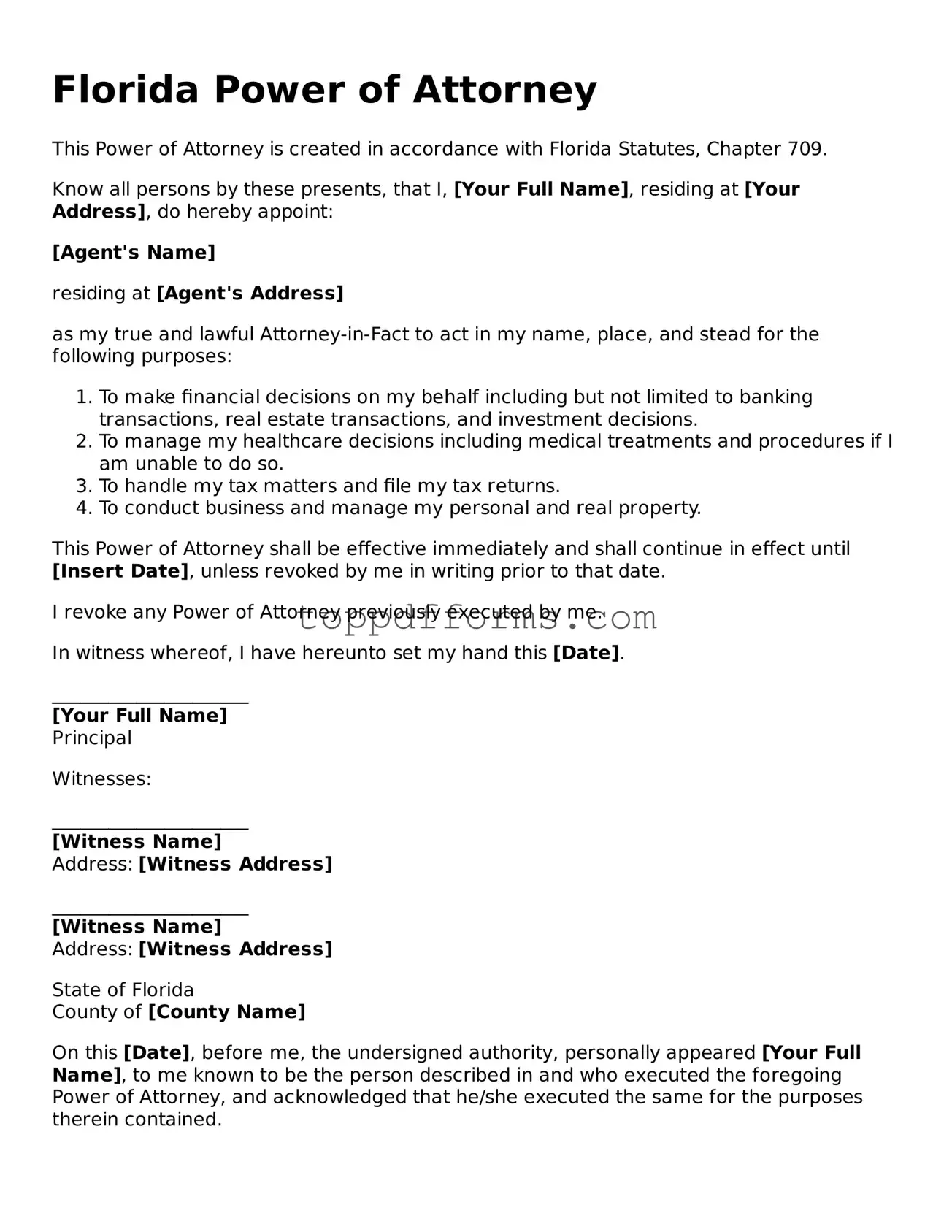Power of Attorney Document for Florida State
Things You Should Know About This Form
What is a Power of Attorney in Florida?
A Power of Attorney (POA) in Florida is a legal document that allows one person, known as the principal, to authorize another person, called the agent or attorney-in-fact, to act on their behalf. This can include making financial decisions, managing property, or handling legal matters. The principal must be of sound mind when creating this document, and it can be tailored to fit specific needs, whether for a limited time or for ongoing management.
What types of Power of Attorney are available in Florida?
Florida offers several types of Power of Attorney forms. The most common are the Durable Power of Attorney, which remains effective even if the principal becomes incapacitated, and the Springing Power of Attorney, which only becomes effective under certain conditions, such as incapacity. Additionally, there are specific forms for healthcare decisions, known as Health Care Surrogate Designation, allowing someone to make medical decisions on your behalf if you are unable to do so.
How do I create a Power of Attorney in Florida?
To create a Power of Attorney in Florida, you must complete a POA form that meets state requirements. This document should clearly state the powers granted to the agent and be signed by the principal in the presence of a notary public and two witnesses. It's important to ensure that the document is properly executed to avoid any issues later. After the form is completed, it’s wise to provide copies to the agent, relevant financial institutions, and healthcare providers to ensure they are aware of your wishes.
Can I revoke a Power of Attorney in Florida?
Yes, you can revoke a Power of Attorney in Florida at any time, as long as you are mentally competent. To do this, you should create a written revocation of the POA, sign it, and have it notarized. It’s also important to notify your agent and any institutions that may have relied on the original Power of Attorney. This ensures that your wishes are respected and prevents any potential confusion in the future.
PDF Overview
| Fact Name | Description |
|---|---|
| Definition | A Florida Power of Attorney form allows an individual (the principal) to designate another person (the agent) to make decisions on their behalf. |
| Governing Law | The Florida Power of Attorney is governed by Florida Statutes, Chapter 709. |
| Durability | This form can be made durable, meaning it remains effective even if the principal becomes incapacitated. |
| Agent's Authority | The agent's authority can be broad or limited, depending on the principal's wishes as specified in the document. |
| Signing Requirements | The form must be signed by the principal in the presence of two witnesses and a notary public to be valid. |
| Revocation | The principal can revoke the Power of Attorney at any time, as long as they are mentally competent to do so. |
Common mistakes
Filling out a Florida Power of Attorney form can be straightforward, but many people make common mistakes that can lead to complications. One significant error is not specifying the powers granted to the agent. It’s essential to clearly outline what authority the agent will have. Without this clarity, the agent may not be able to act effectively on your behalf.
Another frequent mistake is failing to date the document. A Power of Attorney should always include the date it was signed. Without a date, there may be confusion about when the authority was granted. This can lead to disputes or challenges regarding the validity of the document.
People often overlook the importance of having witnesses and notarization. In Florida, a Power of Attorney must be signed in the presence of two witnesses and a notary public. Neglecting these requirements can render the document invalid. It’s crucial to ensure that all necessary signatures are obtained before considering the form complete.
Some individuals also make the mistake of not reviewing the form after it has been filled out. Errors can easily slip through, such as incorrect names or missing information. Taking the time to double-check the document can prevent future issues and ensure that everything is accurate.
Lastly, many people fail to provide copies of the Power of Attorney to relevant parties. Once the form is completed, it should be shared with the agent and any institutions that may need to recognize the agent’s authority. This proactive step can help avoid confusion and ensure that the agent can act as intended when necessary.
Other Common State-specific Power of Attorney Forms
Texas Comptroller Power of Attorney - Revocation must be communicated effectively to affected parties.
Power of Attorney Form Ga - Prepare for unexpected events by establishing a Power of Attorney.
Nc Power of Attorney Form Free - Investigating state laws regarding Power of Attorney is essential for validity.
For those considering property transfer, understanding a straightforward Colorado Quitclaim Deed can be invaluable. You can find additional resources and details on how to utilize this legal document efficiently by visiting our guide on the Colorado Quitclaim Deed process.
How to Get Emergency Power of Attorney in Ohio - It helps avoid confusion when decisions need to be made in critical situations.
